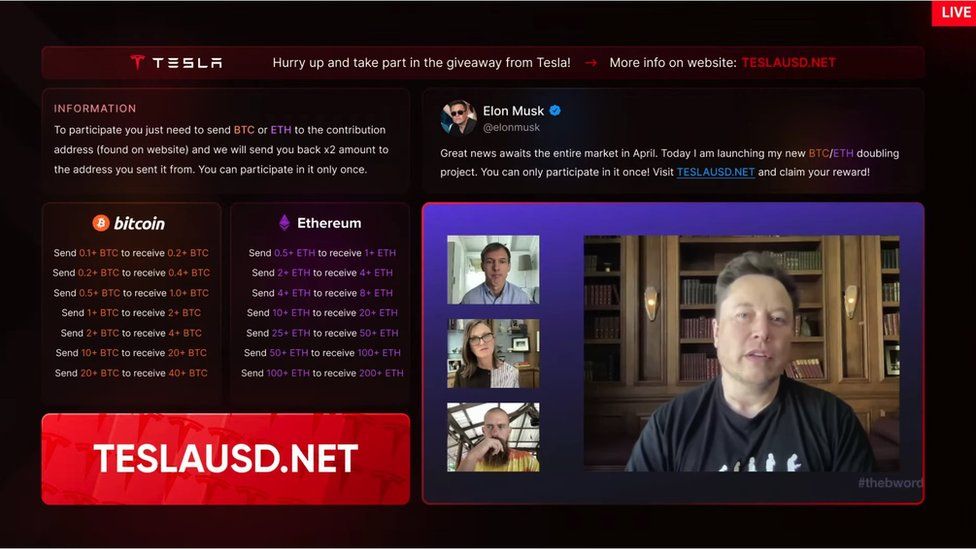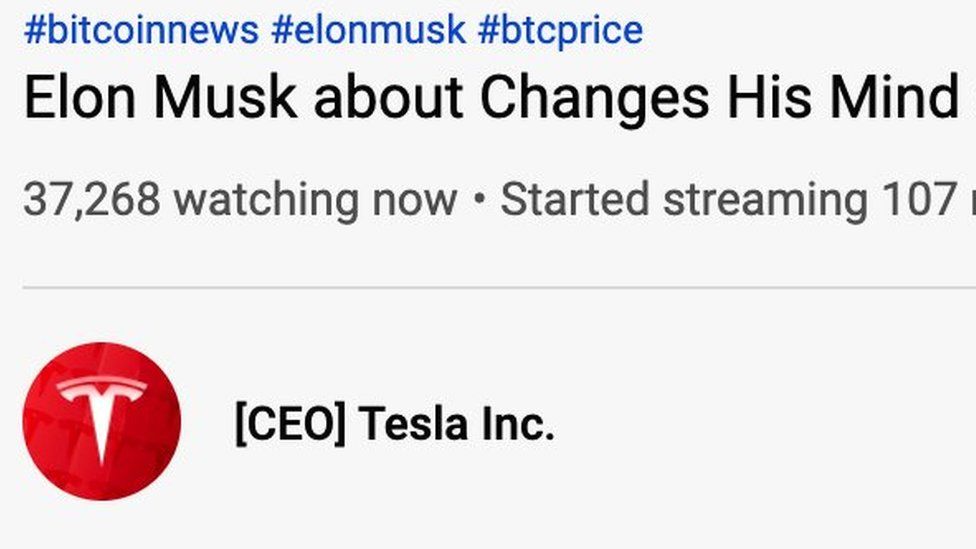By Joe Tidy
Cyber reporter
The criminals are hijacking YouTube accounts and using the videos to promote bogus cryptocurrency giveaways.
BBC News found dozens of these streams being watched by tens of thousands of people over four days this month.
On Tuesday, Elon Musk said YouTube was not tackling “scam ads”. YouTube says it removes channels that are reported.
For many months, the streams have been fooling thousands of people into sending cryptocurrency to criminals, thinking they will receive a prize from Mr Musk.
One of the most common links to website https://elon-x2.live/, which invites people to double their money by sending Bitcoin or Ethereum to the digital-wallet addresses advertised.

Wallet transaction history shows the scammers made $243,000 (£194,000) in just over a week:
- 23 transfers of bitcoin totalling 7.68923261 coins worth $234,000
- 18 transfers of ethereum totalling 5.016 coins worth $9,000
Analysts at Whale Alert say giveaway scammer wallets they track show profits of:
- $98m in 2021
- $30m so far this year

Every few days, the hackers change the name and picture of dozens of YouTube channels to make them look like official Tesla channels, the electric-car manufacturer of which Mr Musk is chief executive.
Chilean urban-music artist Aisack had YouTube channel hacked and hijacked two weeks ago.
“My followers on other social networks started asking me what is going on with the name of my channel and were very confused about why I was streaming Tesla content,” he said.
“I feel completely violated and insecure.
“The hacking of my channel has hurt me a lot, since I am a few days away from releasing a new music video and now I am creating a second channel as a back-up and re-uploading more than 10 years of work on YouTube.
“YouTube is not doing enough on security issues to prevent hacker attacks, since many users are in the same situation as me.”

YouTube said it had removed one of the channels BBC News had alerted it to, adding: “We have strict Community Guidelines prohibiting scams, including Impersonation and hacking.”
Last year, one man hoping to double his money sent scammers $400,000 worth of bitcoins, after seeing a fake advert on Twitter.

“The numbers are going down compared to 2021 – but there are still plenty of victims falling for it, as they evolve their tactics,” Mr Van Weert said.
“Right now, they have been overfishing the sea a bit, especially with Bitcoin prices going down, but that will change as not enough is being done to stop them.”
The scammers could be stopped if cryptocurrency exchanges blocked their wallets to prevent them cashing out their stolen coins, he added.
The vast majority of the fake livestreams show financial firm ARK Invest’s July panel with Musk and then Twitter chief executive Jack Dorsey
An spokeswoman told BBC News ARK “is aware of hacked third-party YouTube channels fraudulently posing as ARK”.
“These accounts are impersonators and not affiliated with ARK Invest in any way,” she said.
“ARK Invest will never use YouTube or other social media to solicit money, including cryptocurrency.”
